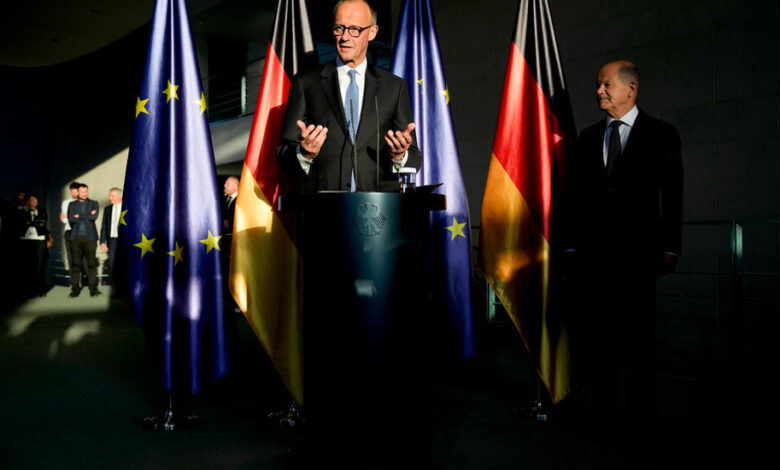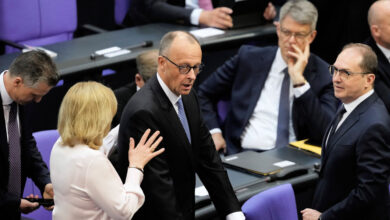Friedrich Merz Has a Tough Job as Germany’s Chancellor. It Just Got Tougher.

Friedrich Merz’s party won Germany’s national election in late February. After weeks of coalition negotiations, Mr. Merz finally made it to the chancellor’s office late Tuesday afternoon, one failed parliamentary vote and several hours behind schedule.
In the interim, nearly all of Mr. Merz’s problems got worse.
Forecasts for the stalled German economy, which Mr. Merz has promised to jump-start, have sagged under the weight of President Trump’s tariffs and trade war. Relations with Mr. Trump’s administration continue to fray.
The far-right political party that many of Mr. Trump’s team seem to favor, the Alternative for Germany, or AfD, has pulled even with Mr. Merz’s center-right Christian Democrats in most polls. If the national election had been held again on Sunday, the AfD might have come in first, even though German intelligence has formally declared it an extremist group.
Tuesday brought the biggest setback yet. Mr. Merz failed to secure the votes to become chancellor on the first ballot in Parliament. Some 18 members of his governing coalition declined to back him. It was a first for modern Germany and a bruise for Mr. Merz, even though he came back to win the job in a second vote in the afternoon.
Mr. Merz already faced towering twin tasks as chancellor. He must show Europe and the world that Germany is ready to assume a leadership role unseen since the heyday of former Chancellor Angela Merkel more than a decade ago. He must also convince a German public that is frustrated with grinding, business-as-usual politics that mainstream parties can deliver needed change.
The first-ballot failure on Tuesday most likely made both tasks harder. At home, the stumble is a reminder that Mr. Merz’s coalition does not command an overwhelming majority in Parliament and that his agenda could be derailed by a few defections on major pieces of legislation.
Mr. Merz is hoping to tighten Germany’s borders and toughen its migration policies to respond to voter anxiety over the millions of new arrivals in the country. He wants to reduce regulations and modernize bureaucracy in hopes of stoking economic growth. Germany’s economy shrank last year, and it has not grown in inflation-adjusted terms for half a decade.
The new chancellor must also pass legislation to spend newly borrowed money for the military, for infrastructure improvements and for initiatives to fight climate change. The initiatives were all approved in the deal he cut with center-left parties in a lame-duck session of Parliament after the election, but are yet to be made into law.
But Mr. Merz’s allies now have growing doubts about his ability to count votes to pass bills. He successfully lined up the backing for the debt deal in March. But in January, he attempted to pass a pre-election immigration bill by relying in part on AfD votes, breaking a German political taboo — and he lost.
Foreign leaders might wonder how much of his agenda Mr. Merz will be able to push through and perhaps how long his government will endure. Spending legislation particularly matters for European partners, who are looking to Germany to lead the way as the continent takes more responsibility for its own defense in the face of Mr. Trump’s threats to pull back American support. Mr. Merz was set to spend his first full day on the job on Wednesday traveling to Paris and Warsaw.
Mr. Trump might now view Mr. Merz as weakened, complicating the new chancellor’s efforts to criticize Washington’s defense and economic policies while cultivating a personal relationship with the American president.
Worries about those aftershocks seem to have jolted members of Mr. Merz’s coalition, including the center-left Social Democrats, back into line on Tuesday afternoon. He gained 15 votes from the morning ballot.
Some lawmakers suggested privately that the initial defections had been meant as personal protests — Mr. Merz has antagonized members across his coalition with policy choices since the election — but were never meant to actually stop him from winning. Perhaps, they suggested, the embarrassment will ensure more unity in the future.
But the events also emboldened the AfD. In opposition, its job is easier than Mr. Merz’s: lean into dysfunction, blame the incumbent government and present its populist agenda as the only option for change in a country fed up with the status quo.
“This government starts out in extreme instability,” Bernd Baumann, an AfD representative, said in a speech shortly before the second parliamentary vote on Tuesday. “And it will remain unstable. That is the opposite of what Germany needs.”
Mr. Merz knows that solving problems like the economy are his best hope to keep the AfD at bay. Polls show he is personally unpopular with voters, who, as in so many democracies around the world, are disenchanted with their longtime political elites.
If Mr. Merz needed additional proof of that, he could have read it on Tuesday morning in the Berliner Morgenpost newspaper, hours before the first, doomed vote.
“Friedrich Merz’s big day,” the lead headline read, “but no euphoria in Germany.”






